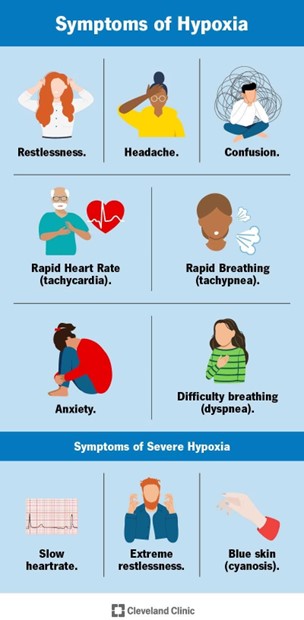The child is a 2-year-old who fell into a pool. He was retrieved from the pool by a family member but was not breathing. The family member started CPR, and the ambulance brought him to the hospital.
What factors are important in determining the level of hypoxemia that the child may have experienced during the submersion?
Select all that apply.
Temperature of water
The weight of the child
Oxygen concentration of the ambient air
Whether or not anyone witnessed the fall into the pool
The amount of time the child was submerged
Correct Answer : A,E
The level of hypoxemia that the child may have experienced during the submersion depends on several factors, but the most important ones are:
- The **temperature of water**: Cold water can induce a diving reflex, which lowers the heart rate and oxygen consumption, and may protect the brain from hypoxic injury. Cold water can also cause laryngospasm, which prevents water aspiration but also impairs gas exchange.
- The **amount of time the child was submerged**: The longer the submersion, the more severe the hypoxemia and the higher the risk of brain damage and death. The survival rate decreases significantly after 5 minutes of submersion.
The other factors are less relevant or not directly related to the level of hypoxemia:
- The **weight of the child**: This may affect the buoyancy and the ability to float or swim, but not the oxygen consumption or gas exchange during submersion.
- The **oxygen concentration of the ambient air**: This may affect the pre-submersion oxygen saturation, but not the rate of oxygen depletion or gas exchange during submersion.
- The **witnessing of the fall into the pool**: This may affect the time to rescue and resuscitation, but not the level of hypoxemia during submersion.

Nursing Test Bank
Naxlex Comprehensive Predictor Exams
Related Questions
Correct Answer is C
Explanation
Choice A rationale:
Domestic violence assistance is an important topic, but it falls under secondary and tertiary prevention rather than primary disease prevention, which is the focus of this community outreach program. Primary prevention aims to prevent the disease from occurring in the first place, while domestic violence assistance addresses an existing issue.
Choice B rationale:
Blood pressure screening is valuable for early detection of hypertension, but it also falls under secondary prevention. Primary prevention focuses on preventing the onset of diseases through measures such as immunizations, health education, and lifestyle modifications.
Choice D rationale:
Outreach for support group information is essential for clients with chronic conditions or specific needs. However, it is not primarily related to preventing diseases at the population level, which is the primary goal of this community outreach program. This topic may be more relevant to secondary and tertiary prevention efforts.
Correct Answer is B
Explanation
Choice A rationale:
Tenderness is not considered a normal finding during percussion of the abdomen. Tenderness suggests an underlying issue or inflammation in the abdominal area, which requires further evaluation and investigation.
Choice B rationale:
Musical and drumlike sounds are considered normal findings during percussion of the abdomen. These sounds indicate the presence of air-filled structures like the stomach or intestines. Normal abdominal percussion sounds are tympanic, and they are characterized by a hollow, drum-like quality when the abdomen is tapped lightly. This finding suggests that there are no significant abnormalities in the abdominal area.
Choice C rationale:
Absent sounds during abdominal percussion are not considered normal and may indicate a potential problem. Absent sounds could be due to factors such as bowel obstruction or severe constipation, which require further assessment and intervention.
Choice D rationale:
Pain during abdominal percussion is not considered a normal finding. It indicates discomfort or tenderness in the abdominal area, which requires further evaluation to determine the underlying cause.
Whether you are a student looking to ace your exams or a practicing nurse seeking to enhance your expertise , our nursing education contents will empower you with the confidence and competence to make a difference in the lives of patients and become a respected leader in the healthcare field.
Visit Naxlex, invest in your future and unlock endless possibilities with our unparalleled nursing education contents today
Report Wrong Answer on the Current Question
Do you disagree with the answer? If yes, what is your expected answer? Explain.
Kindly be descriptive with the issue you are facing.
